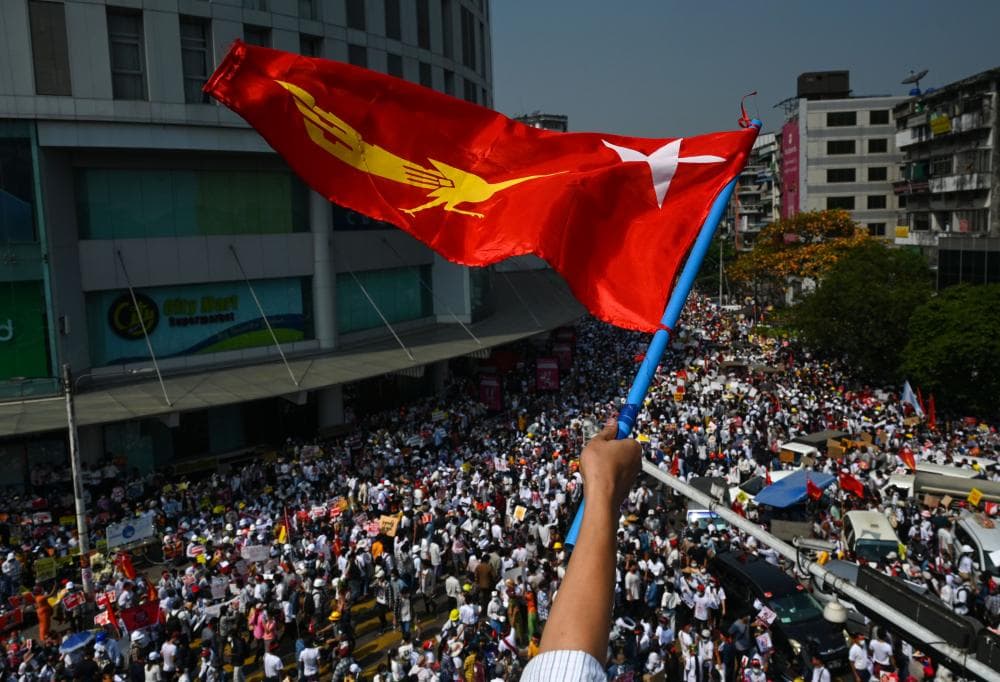‘A constant fear’: Myanmar nationals face imprisonment back home as US ends protected status

Click any word to translate
Original article by Lorcan Lovett
Aung* was finishing his studies in New York when Myanmar’s junta tried to conscript him into the civil war raging in his homeland.
Terrified by the idea, Aung applied for Temporary Protective Status (TPS) in the United States, hoping that by the time he finished his degree the conflict might have calmed. Instead, the war has only escalated.
Now, as the country’s ruling junta plans to hold what are widely seen as sham elections this December, the US government has revoked temporary legal status for citizens of Myanmar – a decision that has put the lives of 4,000 nationals like Aung in jeopardy, all while lending legitimacy to the country’s military government.
Myanmar’s military seized power in a February 2021 coup, overthrowing the elected government and violently suppressing dissent. A patchwork of armed resistance has emerged since, with some fighters joining longstanding ethnic armies as the junta increasingly uses airstrikes and fresh conscripts to counter opposition.
But the Trump administration says the junta’s planned election, and successful ceasefire agreements, show progress in the south-east Asian nation.
“The situation in Burma has improved enough that it is safe for Burmese citizens to return home, so we are terminating the Temporary Protected Status,” Secretary of Homeland Security Kristi Noem announced this week.
The regime welcomed the decision, with spokesperson Major-General Zaw Min Tun telling media that Myanmar nationals in the US can return home to vote, extending “a welcoming hand” for them to participate in “building a modern, developed, and progressive nation”.
‘I’m in limbo’
The US Temporary Protective Status is short-term protection that shields foreign nationals from deportation to disaster zones and allows them the right to work. It will be revoked for Myanmar nationals on 26 January, in a move that has filled the diaspora community in the US with panic and fear.
“We are some of the grateful few that had the chance to escape, but there’s still a constant fear that looms over us about having to go back,” says Aung, one of three Myanmar nationals who spoke to the Guardian on the condition of anonymity.
Aung has a student visa until 2026, but worries that once it expires he might be deported. After this week’s announcement, he has already started on an asylum claim.
Asylum provides a pathway to permanent residency, but it is granted to people who can show they face persecution on specific grounds. The TPS, by contrast, is short-term protection to people from countries hit by disaster, allowing them to work in the US while conditions at home remain unsafe.
“I’m not sure if I’ll have a future here,” he says, “I’m in limbo.”
In 2019 Su Htet* arrived in Washington DC on a student visa and graduated in 2023. Although she is authorised to work she says the city feels increasingly “scary” with regular news of immigration raids.
After the 2021 coup, she organised virtual demonstrations and fundraisers for Myanmar’s striking civil servants. In June this year, officials visited her family home in Myanmar looking for her and her brothers.
“My friend and his siblings were arrested, beaten and tortured by the regime,” she says. “He was finally released, but he’s no longer involved in anything.”
Given her activism and her faith – she is Muslim in a country where ethnic and religious minorities have long borne the brunt of state violence – she fears that returning home is a real danger.
“Just by appearance alone I’d assume they’d question me. Googling my name, they’ll see I’ve spoken out against them,” she says. “I’m pretty scared. I’m alone here; I don’t have any family with me.”
Lungpi*, a Christian from an ethnic minority, secured a scholarship to study in the US. Soon afterwards, soldiers torched his town, leaving it in ruins, forcing his relatives to flee across the border. “You can imagine, all their houses are burned,” he says.
Lungpi was granted temporary protection and an education sponsorship, but once that expires, he says, “there’s a lot of anxiety”.
“Myanmar is far from being safe,” he says. “I’d definitely be arrested if I had to return.”
International Crisis Group senior Myanmar adviser Richard Horsey says Myanmar remains “deeply unsafe with no meaningful improvements in security or governance”.
Elections planned for the coming weeks are “provoking further repression”, he says, adding that those who returned would “almost certainly come under scrutiny and face serious risk of detention or mistreatment”.
By framing these developments as justification for ending temporary protection, Washington “risks reinforcing the regime’s narrative” and could signal to other governments that they can restart ties based on elections, rather than real improvements, he warns.
Aung, who has built a life in New York, is determined not to fall into the junta’s hands.
“Their aim is to oppress,” he says. “As long as you’re young and educated in Myanmar, you’re always an enemy of the state.”
*Names have been changed